I stumbled upon Lifebook Online by Jon and Missy Butcher while searching for something that could help me take control of every area of my life, not just career or health, but everything. At first, I hesitated. A $499 course promising deep personal transformation across 12 life categories? It sounded too good to be true.
But what intrigued me was its unique approach: you answer 21 powerful questions and create a personal “book of life” all while being guided through structured video modules. And yes, they even offer a 100% money-back guarantee if you complete the program and decide it’s not for you.
So I gave it a shot.
In this review, I’ll walk you through my full experience with Lifebook Online — from how the course works to what kind of mindset shifts I experienced along the way. If you’re wondering whether it’s worth the investment or just another overhyped self-help promise, read on. I’ve got you covered with everything you need to know.
Quick Verdict on Lifebook Online
- Book on Life – which you create yourself by answering 21 questions.
- Available in seven languages.
- Be as detailed in your answers and as action-oriented as possible.
- Original price – $1,250. However, it is currently available at $499.
- Individual course. So, you cannot access it under Mindvalley Membership.
- 15-day money-back guarantee.
What Is Lifebook Online?
Lifebook Online is a 21-day course created by Jon and Missy Butcher.
In it, you answer 21 questions centered on 12 categories (Emotions, Career, Parenting, Intellect, etc.) of your life. The questions you need to answer are both simple and deep, digging deeper into the problematic areas of your life or where you need to put more work.
Once you know your stagnant or setback areas, you can take actionable steps to improve overall.
Bonus Read: I have already done a detailed Mindvalley Review for more insights on the platform.
Who Are The Minds Behind Lifebook Online?
With over three decades of marriage, Jon and Missy Butcher have founded nineteen businesses and generated sales worth Billions of Dollars. It got people thinking about how this duo managed to garner success in their overall professional and personal lives.

That inspired the pair to compile every strategy, belief, and life hack they have learned so far into a set of modules. These modules help you answer practical assessment sheets that you can then bind to create your personal Lifebook.
Who is Lifebook Online Best Suited For?
- Looking for some direction in life.
- Too overwhelmed by day-to-day routines.
- Want to quit your job and start a new life?
- Not aware of your pain points.
- Need a detailed goal sheet.
- You are not hopeful about the future.
- Needs an organizer.
Who is Lifebook Online Not Suited For?
- Focuses more on excuses/ Victim mentality.
- Rarely implement the learnings.
- Do not self-reflect and find ways to make your situation better.
The Weekly Module Breakdown
The six-week course taps into 12 categories of your life:
- Emotions
- Health & Fitness
- Parenting
- Intellect
- Social Life
- Finances
- Character
- Vision
- Career
- Love Life
- Quality of Life
- Spiritual Life
The course begins with a 20-minute pre-assessment test that requires you to answer personal and deep questions. It’s essential to be as honest and elaborative as possible when answering these questions.
Because this will help you reflect on where you stand in life and what steps you need to take to improve. These weekly modules are divided into 1.5—to 2.5-hour lessons, each individually discussing the categories I mentioned above.
Each of these lessons covers the same four questions:
- What is your vision?
- What do you want out of this?
- What are some of the beliefs regarding this category that empower you?
- How will you achieve it?
You must answer these questions as truthfully as possible to get the most out of this exercise.
So, explain how and why you feel a certain way about each question. The more you elaborate, the easier it will be for you to follow the outline of your life. Finally, you will take a post-assessment test similar to the one for the pre-assessment.
However, this time, you aim to get a better score than before.
What Questions Does Lifebook Online Ask?
Lifebook Online needs you to answer a list of 21 personal questions. So it can better understand your pain points. These questions are divided into five categories:-
- Building a base
- Visualizing areas of life
- Completing your vision
- Finding purpose
- Taking micro steps
You know what they say? You must fully understand what you are working with to provide effective solutions. Therefore, before committing to the Lifebook service, I recommend carefully reviewing the following questions.
And make sure you answer them as elaborately as possible.
Building Base
1. What deeply held beliefs shaped my life?
2. Are these beliefs empowering?
3. Do they move me at a deep level, or are they holding me back?
Visualizing areas of life
4. How do I want this area of my life to feel?
5. What do I want it to look like?
6. What do I want to be doing consistently?
7. If my life was exactly how I wanted it to be in each category, what would it consist of?
Completing your vision
8. If all my goals and dreams in each category come true, what will my life look like five years from now?
9. What will my dream house, my ideal day, my level of health and fitness, my ideal love relationships and social life, my dream family, my dream career, and my high-quality lifestyle look like?
10. How do I push myself intellectually?
11. What emotions am I experiencing consistently?
12. What specific characteristic traits have I cultivated?
13. What does my spiritual life look like, and how do I integrate spirituality into my daily life?
Finding purpose
14. Why is it important to me?
15. What motivates me to achieve my vision?
16. What energies me?
17. What empowers me to take action?
18. What will I gain if I achieve it, and what will I lose if I don’t?
Taking micro steps
19. What positive habits, attitudes, and actions can I implement?
20. What is the recipe for the vision I want to create in each category?
21. What support do I need on this journey?
Seven Ready-Made Templates of Lifebook Online
How often have you tried to set a goal but could not achieve it? I suppose many times—that is because you lack the proper structure.
Goal setting is not always making a to-do list. Instead, you need a basic structure that helps break down your goals into actionable steps. Thankfully, Lifebook Online offers seven ready-made templates suitable for your profession and goal requirements. So, let’s dig in:-
1. Student Goal-Setting
There are different types of students—some are academically smart, some excel in sports, some like films, and so on. Irrespective of their personal goals, each student needs daily motivation to keep going at their tasks.
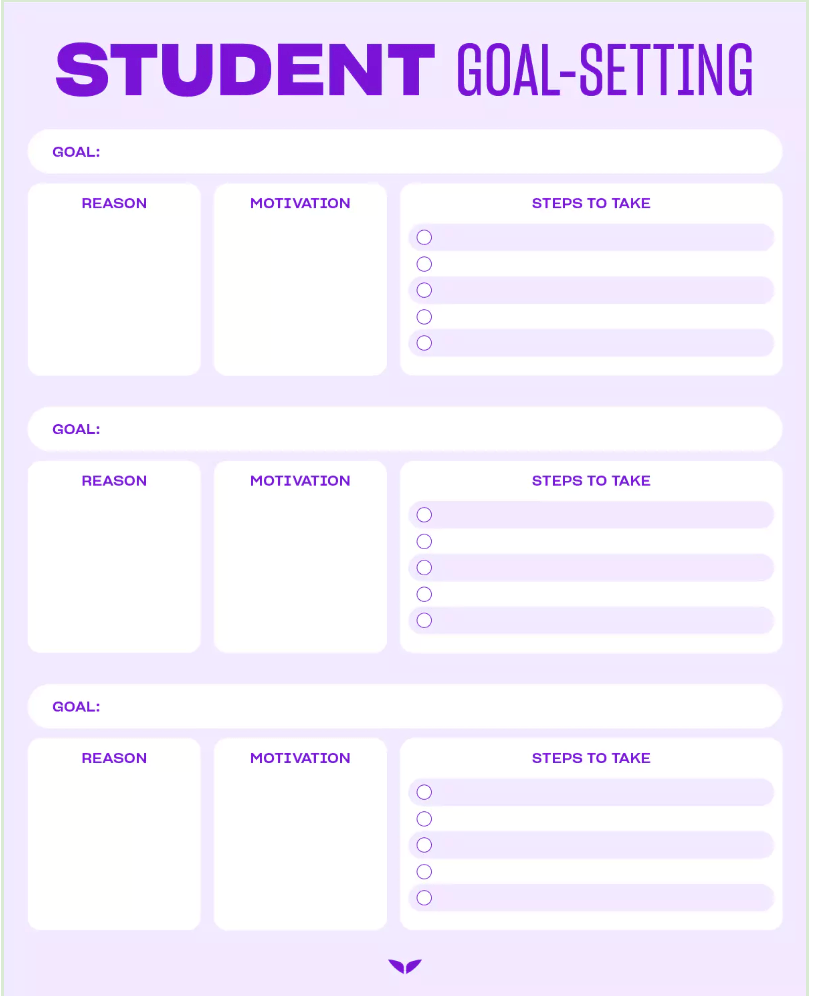
With the help of a student goal template, you get an organized breakdown of the following:
- Your goals
- The reason you want to achieve them
- Motivating factors
- Action points – make sure you keep it as detailed as possible.
As you can see in the screenshot above, there are three spaces. So, you can add both long-term and short-term goals in those blanks.
I suggest adding the daily goals, weekly, and monthly goals.
2. Excel Goal-Setting
Jotting down your goals in an Excel sheet is a more mature way of tracking your tasks. It’s simple and crisp and generally used for weekly tasks. Let’s assume your monthly goal is to lose 20 pounds.
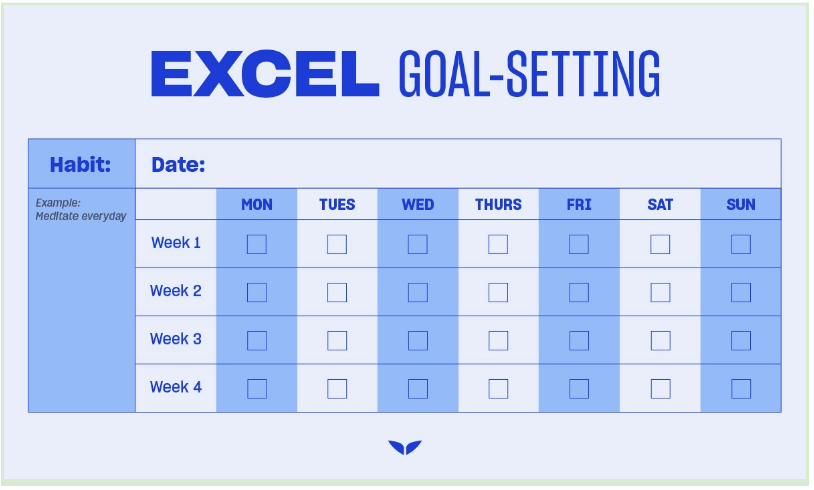
You need to do a certain type of exercise and track your food each week. Start slow and then increase your goals. Once you know what you will achieve this month, start ticking the mark whenever you achieve your weekly tasks.
3. Word Goal-Setting
I love elaborating on my goals. Knowing how the goal will benefit me motivates me.
What are some action steps I need to take? More importantly, within what time range do I want to achieve this goal? Typically, the Word Goal-Setting is used for long-term goals, as you get enough room to break it down into day-to-day goals.
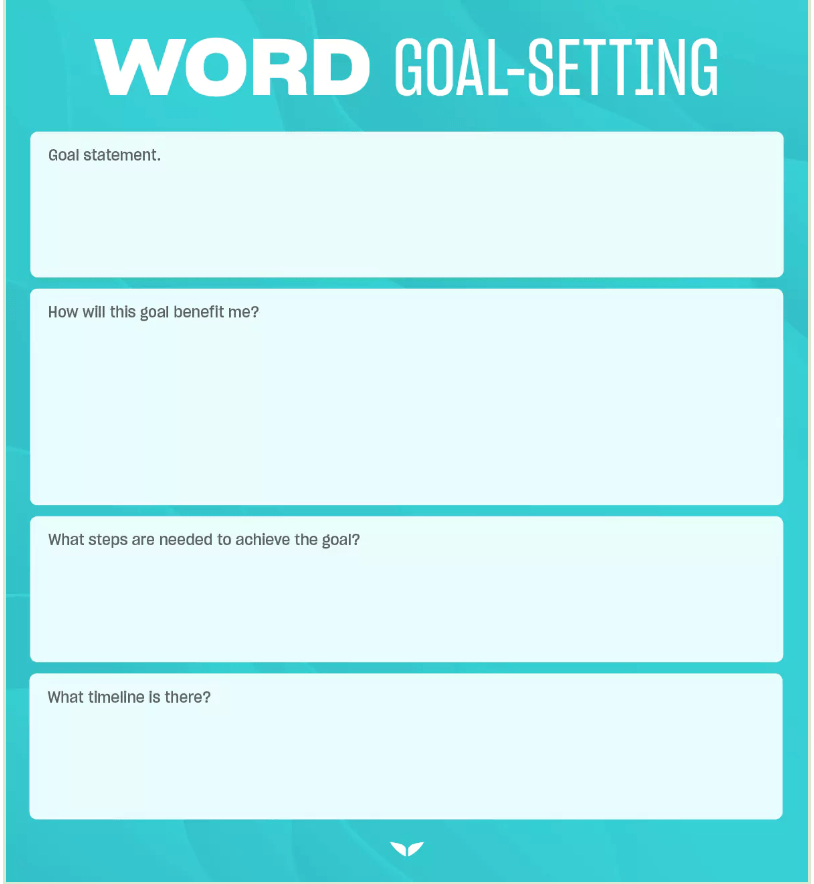
If you are driven by reason, too, then Word Goal-Setting is an ideal template for you!
4. Employee Goal-Setting
This goal template has helped me tremendously as an employee. It’s important to break down your goals into different parts.
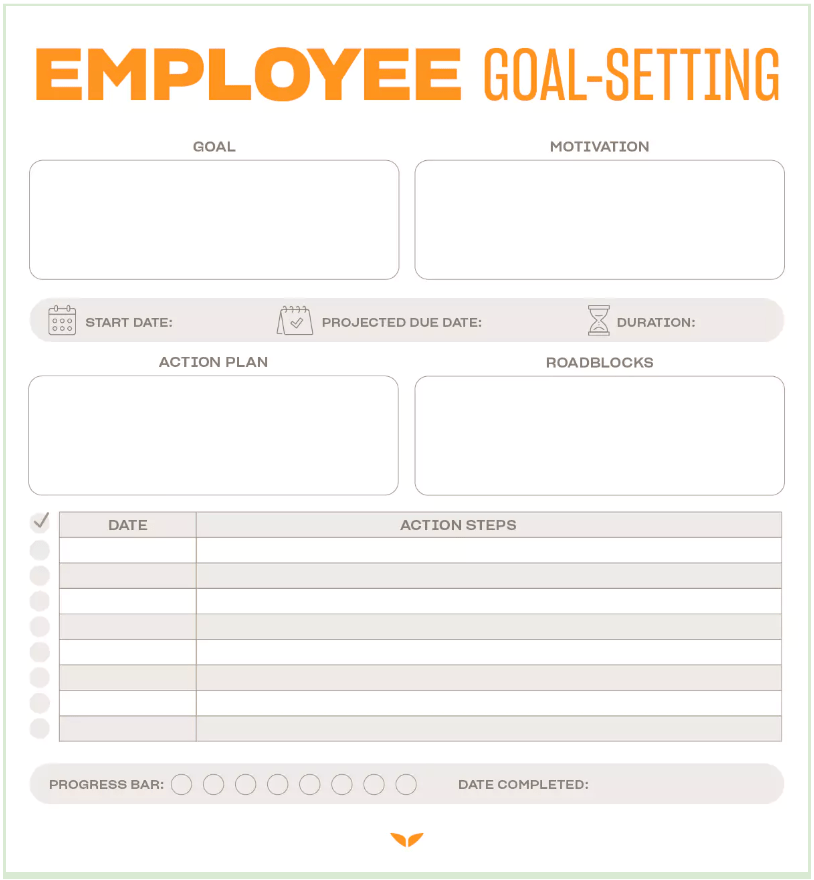
Knowing your obstacles can help you become more productive. Likewise, once you know what motivates you, you can indulge in those activities more. Now, all that’s left is to take the necessary steps to achieve your goals.
So, break down those action points and see your professional life getting more sorted.
5. Smart Goal-Setting
SMART stands for Specific, Measurable, Achievable, Relevant, and Time-Bound. Each letter has a blank space in front of it – under it, you can see a question. By filling up these spaces, you are giving your goals more dimension.
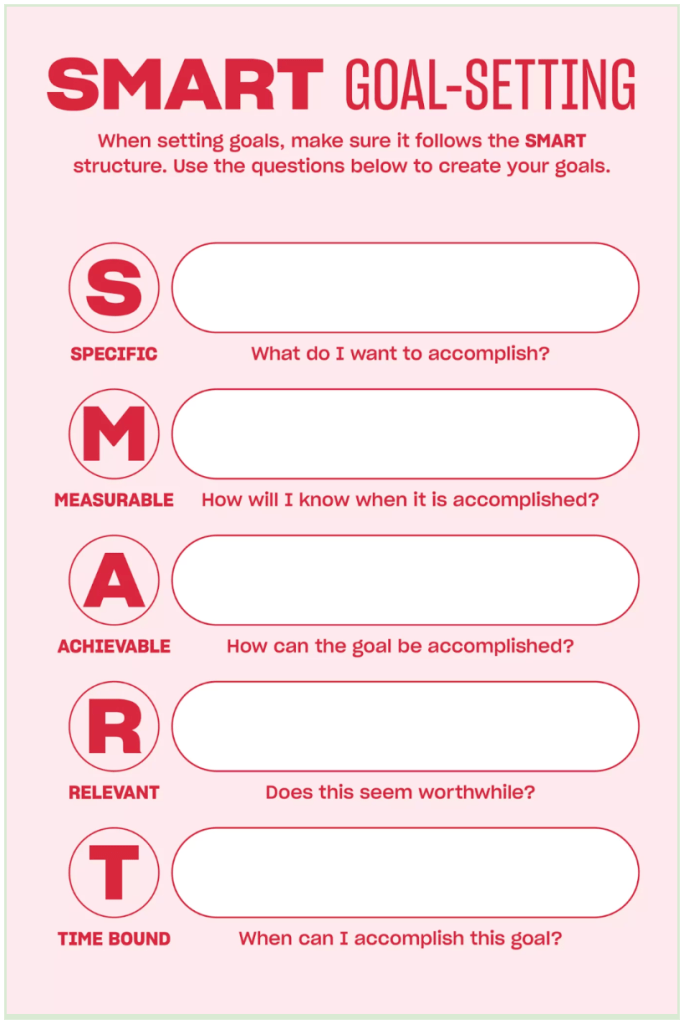
You are breaking down into action points, which helps you understand:
- What do you want to accomplish?
- How can you do it?
- Is it a realistic goal?
- When would you like to achieve it?
6. Monthly Goal-Setting
If you prefer creating goals monthly, then using a template specifically created for that is ideal. I suggest having at least three goals and dividing the steps into the three columns displayed in the template.
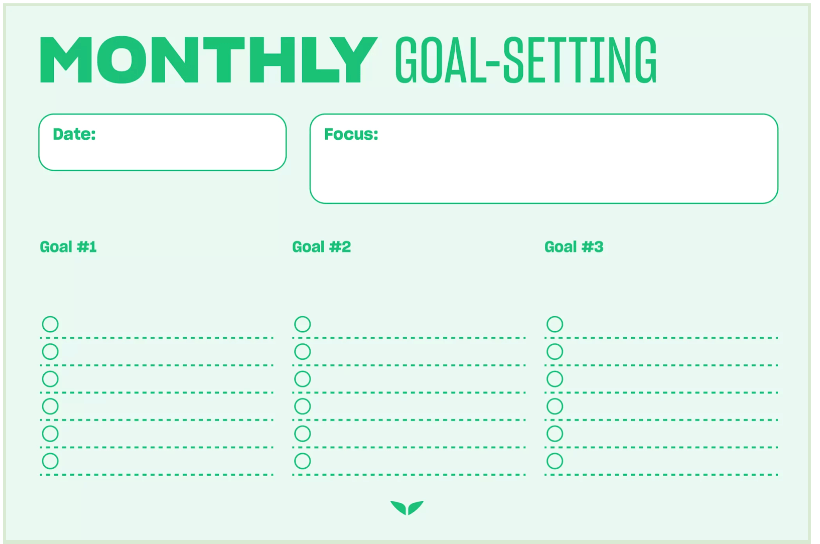
Simply add the steps in each section and keep track of whether you are achieving it on time.
7. Annual Goal-Setting
Do not be fooled by the simple template—it is best for creating annual goals. You can fill out the five goals by elaborating on your travel plans, things you want to quit, something you want to achieve, a skill you want to learn, and investing more time in.
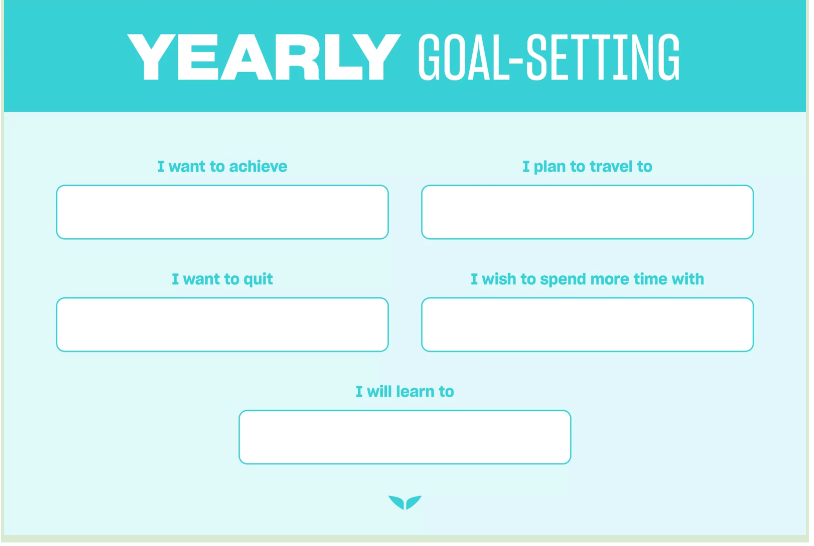
Then, you can use monthly or weekly templates to divide these long-term goals further!
Why I Started The Course? (My Learnings)
I’ve always been a bit of a self-improvement junkie, but lately, I felt stuck. That’s when a friend mentioned Lifebook Online. At first, I was skeptical – another course promising to change my life? But something about it resonated with me, so I took the plunge.
Looking back, I’m so glad I did. Here’s why I started Lifebook and what I’ve learned so far:
1. I needed a fresh perspective
Life had become a bit mundane: wake up, work, sleep, repeat. Lifebook forced me to step back and look at the bigger picture, making me question what I really wanted in different areas of my life.
2. I was craving structure
Sure, I had goals, but they were all over the place. Lifebook gave me a framework to organize my thoughts and aspirations. It’s like having a roadmap for life – cheesy, I know, but it works!
3. The community surprised me
I’m not usually one for group activities, but connecting with like-minded people has been unexpectedly awesome. We share our struggles and victories, and it’s comforting to know I’m not alone on this journey.
4. It’s not just about goals
I thought Lifebook would be all about setting targets, but it’s so much more. It’s made me dig deep into my beliefs and values. I’m understanding myself better, and that’s pretty cool.
5. Small changes, big impact
One of my biggest takeaways is that tiny, consistent actions can lead to massive changes. I’ve started implementing small habits, and I already see a difference in my energy and outlook.
6. It’s okay to dream big
Somewhere along the way, I’d stopped dreaming. Lifebook encouraged me to think beyond my current limitations. It’s both exciting and terrifying, but mostly exciting!
7. Balance is key
I used to focus heavily on my career, often at the expense of other areas. Lifebook has shown me the importance of nurturing all aspects of life – health, relationships, personal growth, and more.
Is Lifebook perfect? No. There are moments when I feel overwhelmed or doubt myself. But overall, it’s been an eye-opening experience. I’m learning to be more intentional about my life, and that alone has been worth it.
If you’re feeling stuck or just curious about what more life has to offer, maybe give Lifebook a shot. Who knows? You might surprise yourself, just like I did.
Is The Jon & Missy Masterclass Impactful In The Long Term?
Jon & Missy’s masterclass indeed has a long-term impact. When I created the Lifebook Online book, I was genuinely clueless about where my life was heading or whether I wanted it to go anywhere. So, I used the blank pages to jot down my last wishes.
Chasing these experiences would take me at least 2-4 years, so personally, Lifebook Online has a long-term impact on me.
However, you can sustain some of your short-term goals, too.
Just make sure they are relevant. Otherwise, with changing interests, you need to make a new book every 1-2 years (depending on whether your goals are achieved.)
Bonus: If you want to save a few extra bucks on the Mindvalley. Check our working Mindvalley Discount Coupon here.
How Much Does The Program Cost?
Unlike other Mindvalley courses, Lifebook Online does not come under the all-access pass.
Instead, you need to purchase the program individually (click here). The original price of the program is $1250. However, currently, you can join it for $499.
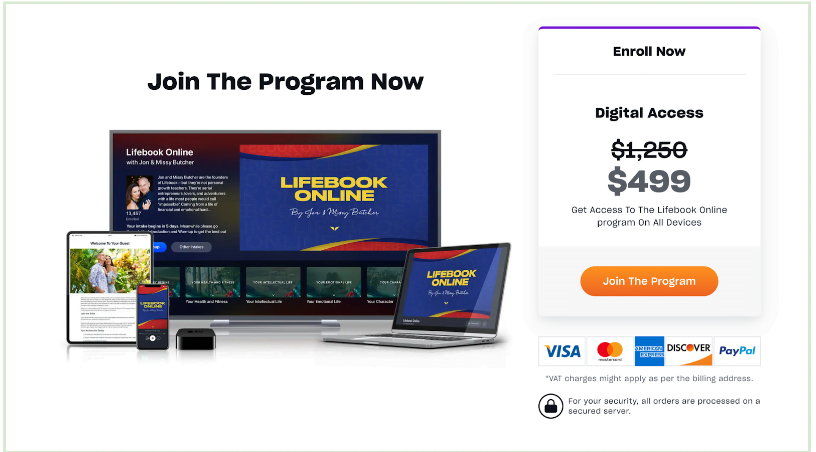
The best part of the program is that you get a 15-day money-back guarantee.
So, if you are unhappy with your experience with the 21-day course, cancel your subscription by the 12th or 13th day, and you will receive a full refund.
Therefore, if you ever struggle with the refund process, you will have enough time to avoid unnecessarily paying for the subscription.
Refund Policy: Is the $500 Lifebook Refund Real?
Yes, the $500 Lifebook refund is real and has been confirmed by many users, including those on platforms like Reddit. Here’s how it works:
- 15-Day Risk-Free Trial: You can request a full refund within 15 days of purchasing the Lifebook Online program via Mindvalley—no questions asked.
- $500 Completion Refund: If you pay the $500 enrollment fee, complete all 21 modules, finish your Lifebook, and submit your completed work, you’re eligible to claim your money back. This is a motivational refund model designed to ensure commitment and high completion rates.
Related Read:
Wrapping Up: Lifebook Online Review – Highly Recommended!
My Lifebook Online review shows that this 21-day program acts like a personal guide to identify what’s holding you back and how to improve every area of your life. Jon and Missy Butcher designed pre- and post-assessments where you answer 21 deep, thought-provoking questions covering different life categories.
The more honest and detailed your responses, the easier it becomes to take meaningful action toward your goals. This $499 course is sold separately and is not included in the Mindvalley All-Access Pass, so you need to purchase it individually.
If you’re ready for a 360-degree life transformation, this “book on life” could be exactly what you need. And if you’re not satisfied within 15 days of signing up, you can cancel and get a full refund – no risk involved.
FAQs
Mindvalley’s all-access plans do not include partnered programs like Lifebook Online, Wilfit, and Certified Programs. So, if you want to access these courses, pay for them individually.
Despite many articles claiming a seven-day trial, the Mindvalley website does not mention the free trial. When you subscribe to the membership, you do not see any “billing starts after your free trial ends” message. The most you get from Mindvalley are 60-to-90-minute weekly free programs.
Lifebook Online offers a 15-day refund policy. However, for a hassle-free cancellation, I recommend applying for a refund at least a few days before your offer ends.

I’m Ishan from Toronto, dedicated to simplifying online education choices. I explore and review eLearning platforms and courses. My insights are shared on “Enlightened Learning,” helping learners make informed decisions. Passionate about making education accessible and engaging for all.
